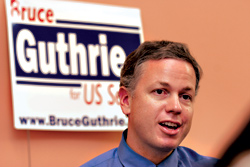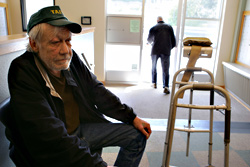Only three months ago, King County Sheriff Sue Rahr, who took office as an appointed sheriff last January, looked like a shoo-in to permanently fill the post of former Sheriff Dave Reichert, elected to Congress last fall. Little-known outside law- enforcement circles, Rahr had been Reichert’s chief of operations since 2000, and influential officials were endorsing her and contributing money to her campaign. Former U.S. Sen. Slade Gorton gave $100, and so did King County Prosecuting Attorney Norm Maleng.
Then came summer, and now Rahr has a mess on her hands—and so do her two opponents.
As a result of controversy surrounding a King County Sheriff’s Office detective gone wrong and her failure to win the endorsement of a key law-enforcement union, Rahr’s name is now known publicly and in unfavorable terms. She also faces serious dissension among KCSO deputies—dissension so strong that it has led some patrol cops to casually engage in depolicing. It’s not something deputies will agree to be quoted about—they’d like a hassle-free future no matter which candidate is elected by voters in November. KCSO is the state’s third-largest police agency, with a $110 million budget and 700 sworn personnel who patrol unincorporated King County and 13 suburbs in the county, including SeaTac, Sammamish, and Shoreline.
Rahr is challenged in the Sept. 20 primary by veteran KCSO Sgt. Jim Fuda, who has baggage of his own, and Seattle Police Lt. Greg Schmidt, whose past includes a domestic violence acquittal. The top two will be on the Nov. 8 ballot.
In July, the first of Rahr’s problems cropped up in the form of an endorsement vote by the King County Police Officers Guild that represents the department’s deputies and detectives. The vote is an important barometer of how patrol cops feel about department leadership.
That month, Fuda, a 32-year veteran of the department and its chief hostage negotiator, won the guild’s endorsement.
KCSO sources say that few expected Rahr to win the endorsement. She and her backers in the department recognize that average cops are disappointed with Rahr. But many within KCSO were surprised by Fuda’s margin of victory in votes cast by union members. Fuda won the vote 259 to 169. Schmidt got six votes.
KCSO deputies interviewed in recent weeks describe it as a no-confidence vote and a reflection of flagging morale among patrol cops.
Why are deputies unhappy with the sheriff, who has only been in office since the New Year? The causes have to do with the department’s recent history.
The way the troops explain it, Rahr had been de facto sheriff during much of 2003 and 2004, when Reichert began to focus less on being Sheriff Dave and more on being Political Candidate Reichert. In 2003, influential Republicans saw Reichert as a potential star, either for a run at governor or Congress the following year. Deputies say Reichert began to run the department in ways to make himself politically appealing to voters, especially when it came to taking a lot of credit for bringing Green River killer Gary Ridgway to justice.
Reichert was famously the first detective to work the Green River case back in 1982, when prostitutes who worked the SeaTac area either disappeared or were found dead. Eventually, more than four dozen prostitutes turned up missing. The case was a deep psychic wound in King County.
Reichert became sheriff in 1997, when the case was unsolved and Ridgway was among a number of possible suspects. The case had languished for years. At Reichert’s behest, KCSO detectives began working the case anew. In 2001, Ridgway was identified as the killer by DNA evidence and was arrested. In 2003, he confessed to killing 48 women in a deal designed to spare him the death penalty. Ridgway led detectives to the graves of many of the women’s bodies.
Suddenly, local and national media turned Reichert into the hero who had solved the case. Reichert did nothing to dissuade them.
KCSO veterans cringed. In their minds, the case was a team effort with KCSO Dets. Tom Jensen, Randy Mullinax, Sue Peters, Jon Mattsen, and the late Jim Doyon playing leading roles. They weren’t getting public credit for solving one of the largest serial-murder cases in U.S. history. Meanwhile, Reichert and his political handlers used the case to burnish Reichert’s public image. Reichert wrote a book about running Ridgway to ground. Published in 2004, Chasing the Devil showed up in prominent store displays featuring Reichert’s mug throughout King County.
Cops hate criminals. But they hate politicians almost as much.
In the fall of 2003, as Ridgway was marched off to life in prison, an incident occurred that drove a deeper wedge through KCSO patrol ranks. KCSO Dets. George Alvarez and Jim Keller allegedly beat and pepper-sprayed an uncooperative informant and then allegedly threatened to throw him into the Green River. A Des Moines police officer reported the incident to superiors.
The two detectives are popular in KCSO, reputedly paragons of old-school rough-and-tough policing.
Reichert ordered that the two be arrested and jailed, a decision that Rahr, then No. 2 in the department, endorsed. Among deputies, the move was viewed as another attempt to make Reichert a tough-seeming public official, even though KCSO cops hadn’t faced anything approaching that level of discipline for past transgressions.
Even deputies who cringe at what the two allegedly did have problems with how they were treated. Alvarez and Keller were jailed over a weekend. At the time, Keller’s wife was pregnant and at home alone. Among family-obsessed cops, that was seen as a massive show of disrespect for a smart, dedicated, and well-liked detective.
The two were tried on criminal charges, and in 2004, a jury was unable to reach a verdict in the case (it did find Keller not guilty on an assault charge). Both men, demoted to deputy and suspended for 20 days by Reichert, have filed suit against the department.
The Alvarez-Keller dustup was viewed as a signal that if a deputy enforced the law too aggressively, Reichert and Rahr would discipline the deputy to curry political advantage. As a result, patrol deputies said in recent interviews, many on the force have avoided proactive policing—pulling over cars that look to be stolen, for example—and have focused on answering 911 calls exclusively.
It was against that backdrop that union members voted to endorse Fuda, a genial sergeant and political novice.
Then came the big blow to Rahr’s image.
In a series of articles in August, Seattle Post-Intelligencer reporters examined how Rahr reached a questionable deal with Dan Ring, a longtime KCSO detective, to get him to leave the department. Ring, who worked in the department’s intelligence unit, allegedly leaked investigatory information to suspected criminals, had sex with prostitutes, revealed the identity of undercover Seattle police officers, flouted KCSO policies, and, according to the P-I series, did very little conventional police work for more than a decade. An internal investigation of Ring was so botched that Rahr and King County prosecutors decided they couldn’t bring an effective criminal case against him.
Instead of firing Ring, Rahr worked a deal with Ring where he agreed to retire this fall and would receive his full pension of $3,500 a month.
Her goal, Rahr says, was to get rid of a bad cop and ensure that he wouldn’t later be reinstated by a federal arbitrator.
The P-I series painted the outcome as a sweetheart deal. As a result, Rahr says, she has been approached by voters accusing her of trying to cover up the Ring case.
“I still think it was the right decision,” says Rahr.
Within the department, rank-and-file members have reportedly confronted Rahr about how Ring could have gotten away with his misdeeds for so long.
“I’m embarrassed for every officer who wears our badge,” says Fuda.
But Rahr does have supporters within KCSO. They paint her as a victim of Reichert’s politically minded decisions and as a leader willing to push hard to make unpopular changes within the department. KCSO officials credit her with taking prompt action, for example, to rewrite department policies on Taser use when it became clear that deputies were sometimes using the devices inappropriately.
In a recent interview, Rahr said she often disagreed with decisions Reichert made while she was his No. 2, but that she kept quiet instead of voicing her concerns for fear of presenting department leadership as divided.
“That’s not how command should behave,” she said. She added that, if elected, she plans to aggressively work to repair morale in the department. KCSO deputies doubt her ability to pull off that trick, but Rahr’s backers say her willingness to make tough, unpopular decisions will actually work to her advantage by making deputies respect her forthrightness.
Neither of Rahr’s primary opponents is free from black marks on career or image.
In 1998, Schmidt was arrested by KCSO deputies on a domestic-violence charge brought by his wife. Acquitted in 1999, Schmidt later sued King County for gender discrimination. That lawsuit was later dismissed by a judge.
According to KCSO records obtained by Seattle Weekly, neighbors who provided witness statements to KCSO said they were scared of him. In an interview, Schmidt explained how the arrest led to a not-guilty verdict, but when asked why his neighbors might have feared him, Schmidt had no answer.
While Fuda was a KCSO narcotics detective in 1979, he was given a 30-day suspension and demoted to deputy for an incident in which his partner allegedly lied about the handling of $300 given to an informant for a drug buy.
And in an embarrassing more-recent development, Fuda admitted last week that he had received a college degree—based on life experience, not coursework—from an online university that was shut down by the Federal Trade Commission in 2003. The degree allowed Fuda to qualify for a 2 percent pay raise in 2002.
Sgt. John Urquhart, KCSO spokesperson, says the department is investigating all college degrees held by KCSO personnel. Following a separate investigation of Fuda’s degree by an outside agency (brought in because of the politics involved, according to KCSO), Fuda might be required to return the pay raise, which may have amounted to $5,000 since 2002, Urquhart estimates.
Fuda says he did nothing wrong and only got the degree for “personal satisfaction” and has no plans to return the money.
“I called the KCSO personnel office and told them what the degree was, and they said send us a copy of the diploma,” Fuda says. His 2 percent raise was approved by KCSO, according to Urquhart.








